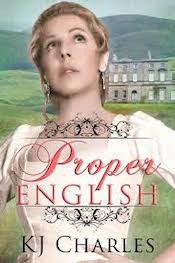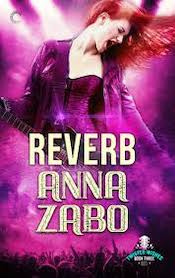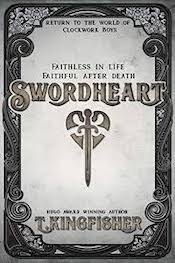Kissing Books: The placeholder heroine is...
Every month, Olivia Waite pulls back the covers, revealing the very best in new, and classic, romance. We're extending a hand to you. Won't you take it? And if you're still not sated, there's always the archives.
1992’s landmark volume of romance criticism, Dangerous Men and Adventurous Women, has had a difficult afterlife. One particular specter from romance author Laura Kinsale’s essay haunts the genre like the ghost of a first wife contemplating arson in the attic.
I speak of: the placeholder heroine. I loathe it — both the term and the theory — and I’m going to tell you why.
Kinsale’s original essay uses the term placeholder heroine to mean the reader allows the plot to carry her through the book, enjoyably, even if she knows she would make different choices than the heroine in the story. It’s anti-identification. But the phrase has taken root in the readership as a way of describing a heroine who is so bland and invisibilized that she allows the reader to almost literally take her place as the emotional focus of the story. Bella Swan of the Twilight series, for instance, gets pulled into this discussion a lot, poor girl. Cinderella, too, is assumed to be an empty vessel so the reader can bask in the relief of being rescued.
The idea — and I am describing it, not recommending it or saying it’s automatically true — is that readers pick up a romance because they want to fall in love with and feel loved by the hero, and any heroine who is too specific, too real, or too present gets in the way of the reader’s hoped-for experience.
That some readers go looking for this is undeniably true. The existence of the unfortunate phrase book boyfriends attests to this. Also this verging-on-nihilistic Guardian piece from 2009 about one woman’s tragic attempt to write a category romance; the article reads like a triple-layer chocolate cake made of self-loathing and internalized misogyny — and contains the line which is now branded upon my memory: “Mills & Boon heroines are like madams in brothels. They essentially have to facilitate a sexual encounter between two other people — the reader, and the hero.”
I’m not going to pretend that nobody’s ever rubbed one out over a domineering Harlequin Presents tycoon but good Lord that writer is really stretching a metaphor to the point of absurdity.
Other, successful authors aren’t so vulgar or Freudian, but it’s common to talk about writing heroes they hope readers will fall in love with. It’s widely assumed the reader will establish a sexual/romantic connection with a hero. It’s unclear how much of this is a marketing angle, and how much is what people think the books actually do in practice.
In this framework a romance can be for the heroine, or for the reader, but never both. And for the reader to be at the center of the story, to take the heroine’s place, she has to erase the heroine as much as she can.
I can’t be the only person who gets a little creeped out by that.
Granted, I’ve gone on record as someone who tries to focus on heroines as much as possible, out of feminist and contrarian impulses. The fact remains that there are some nasty side facets to the placeholder heroine conversation: for one thing, the idea that dubcon/forced seduction scenes can get the reader’s consent, if not the heroine’s. I find this, in a word, squicky.
For another thing, for a placeholder heroine to work as described, she can’t have any marks of difference that the reader does not share. Some white readers infamously say they can’t relate to a heroine of color because they can’t or won’t identify with her. Their white awareness of a black heroine’s difference prevents them from being able to disappear into her persona.
And the entire conversation around placeholder heroines is grossly heteronormative and cissexist because it doesn’t take queer/trans people into account at all, as readers or as main characters — though it might go a long way to explaining those parts of m/m romance that are all about straight women playing Now Kiss! with sexy fictional dudes. Because if someone’s internalized the Other Women Are Automatically Competition thing real deep then even the blandest placeholder heroine might be too much, and they can only let go and enjoy things if the whole Woman Question is off the table. (Men are aspirational identification; we’re all taught how to empathize with them.) Sometimes this even comes cloaked as liberal-mindedness, as in many of the comments to this Goodreads poll: a lot of people sincerely believe that gender inequality magically vanishes when the two main characters share a gender.
Let us be clear what a placeholder heroine is not: recognizing a meaningful part of yourself in a fictional character. That is plain human empathy, that is what the push for inclusive fiction is fighting for, that is something every one of us needs and deserves.
The placeholder heroine is the expectation that we have to separate, and choose between, the reader and the heroine in order for the book to do what it promises.
The placeholder heroine as a concept means that we’re only allowed One Completely Human Woman, either us or that chick on the book cover.
Identification, recognition, books as mirrors and windows — these are identification-as-sharing. It’s communal, and comforting, and builds community. The placeholder heroine is identification-as-supplanting. The framework marks a character — a main character! — as replaceable, as a blank space, as a territory to be conquered and colonized. Which is why we have to do it to heroines, who are women, the Officially There To Be Conquered Gender.
When readers go in expecting to be able to take the heroine’s place, they might feel cheated if she is unerasable. Perhaps this is one of the (many) reasons why heroines take the brunt of criticism in reviews, whether they’re difficult or prickly characters or not.
Plenty of readers do not read this way, at all. Plenty of readers are looking for heroines they can root for, who they could imagine being friends with, who are compelling and interesting and funny and just plain fun to be around. Heroines who share their struggles and fears (the surge of readerly love for Portia, the heroine from Alyssa Cole’s A Duke by Default who finds out as an adult that she has ADHD, is a marvelous recent example of this). Me, I love a lonely heroine, your Anne Elliots and Jane Eyres and anyone who secretly worries they’ll never be quite good enough to deserve love.
None of the heroines in the books reviewed below are placeholders. They are rich, vibrant, unique, and uniquely lovable fictional people.
Erase them at your peril.
Recent Romances:

Proper English by KJ Charles (self-published: historical f/f):
When presented with an f/f romance that is also a country house party murder mystery, three immediate questions fix in the mind: 1. Which character is our heroine going to fall in love with? 2. Which character is our soon-to-be victim? and 3. Which character is the killer?
Since Proper English is a prequel to the author’s much-recommended Think of England, we know the answer to number one: Pat’s going to fall hard for Fenella Carruth—who is, unfortunately, presently engaged to our host.
Answers two and three take up the rest of the book, and it’s an absolutely marvelous journey.
I’ve become so used to KJ Charles’ more Machiavellian-minded heroes (hello, Any Old Diamonds and Henchmen of Zenda) that Pat’s directness took a bit of getting used to. Not in a bad way—it was just a more no-nonsense voice than I was expecting, since Pat is the straightest shooter in England. Literally: she recently won the All-England Ladies’ Championship. Once I re-tuned my ear, the rhythms carried me along as always. Pat is intelligent, thoughtful, observant, kind, frighteningly competent, and humble enough to think none of these virtues are enough to make her more than ordinary. This complexity meant that despite her supposed plainness of character (she certainly thinks of herself as plain in figure as well as in intellect), every emotion of hers rang me like a bell whenever it turned up. Pat’s love for her brother Bill, her complicated grief for their two lost siblings, her tumble into attraction and passion—they’re all the more glorious for coming on quietly.
Fen, our other heroine, is one of my favorite archetypes: the bouncy, fluffy, run-on-sentence kind of adorable with undiscovered metal beneath the fluff. She’s an absolute confection and I wanted to fix her a sugary cocktail and listen to her ask endless questions forever. The contrast and chemistry she has with Pat is exquisite, and I can’t wait to see more of them in the copy of Think of England that’s been languishing in my TBR for far too long now.
As for the killer and victim … Lately I’ve been in an Extremely Vintage Murder Mood, watching grainy miniseries with Peter Wimsey and Harriet Vane, picking up used copies of Highsmith’s best, mainlining any detective show that focuses more on the social puzzles than on the physical detritus of the crime scene. It’s a hunger for something—a feeling, an emotional experience, a palpable resolution, justice. Things that feel increasingly hard to find in the real world.
This book was precisely the thing to sate the appetite.
“These sorts of things are miserable for ladies.”
“Technically, you’re a lady,” Bill pointed out.
“Not for the purposes of a shooting party I’m not, and Jimmy had better remember that.”
“He will,” Bill assured her. “Nobody would invite the All-England Ladies’ Champion to a shooting party and ask her to crochet doilies.”
“Oh yes they would.”

Reverb by Anna Zabo (Carina Press: contemporary trans queer m/pan f):
Reverb as a musical term is about echoes: what you don’t quite hear, what you hear too much of, what whispers on the edges of a note or a chord. A double layer of sound. Anxiety and trauma do something similar to the human body/mind — pain amplifies or muffles a signal, distorting the sound and disturbing the peace. The past is always a little audible in the present.
Readers should go in knowing Anna Zabo’s latest rock star romance starts with a stalker plot, necessary to give our bodyguard hero David and rock queen heroine Mish a reason to collide. But the real stakes in the book are about identity: David and Mish have both fought for decades to become completely themselves, and take pains not to demand anyone else bend or change or sacrifice too much out of respect for the difficulty of being a complete person. They both pride themselves on being the strong one, the caretaker, and they are happy to take care of one another (both in and out of bed — the sex scenes are delightfully switchy). This carefulness is precisely what brings the biggest conflict: two characters desperately in love with one another, deeply invested, who feel they can’t even ask for what they really want because the act of asking feels too much like demanding submission. Better to step back, to hide tears, to die quietly inside without anyone ever knowing.
It’s a little about pride — but a little about boundaries, and it’s complex and utterly gripping.
First two Twisted Wishes books were very much about characters learning how to cope; this book is about capable characters learning how to thrive, which is an entirely different challenge. I tore through the chapters, hooked as always by the vividness of Zabo’s glam-rock world and the dazzling characters — but the more I reflect on the book afterward the more allegorical it seems, like a chess game whose strategy is only revealed in hindsight. The external threat becomes a Gothic gloss on the central emotional dilemma: the villain is someone who demands what he has no right to, someone who overreaches, who ignores the plainest and most basic of boundaries. The stalker (mild spoilers?) is eventually caught but never named, which is a supremely, breathtakingly elegant way to villainize him in a romance with a trans main character where names are meaningful choices and assertions of identity.
The book feels effortless, but the gut-punch lingers — just like any good rock anthem should.
Emotional hangovers were worse than alcoholic ones. She didn’t get drunk that often, but when she did, she could blame the nausea and headache on being foolish.
This wasn’t foolishness, but her life.

Kiss and Cry by Mina V. Esguerra (self-published: contemporary m/f):
The #romanceclass hashtag on Twitter has become one of my go-to places to check for contemporary romance: every one of the Phililppine-based authors promoting there seem to have perfected the delicate balance between angst and escapism. This book caught me because I have absolutely no chill where figure skating/hockey romance combinations are concerned — but while I got plenty of insider athletic competence, as promised, I also got a rare and thoughtful view of a real-world city, and what it means to the people who live there, move there, and/or are from there. The romance is solid and the sex is definitely great, but it was Mina V. Esguerra’s marvelous sense of place that really blew me away.
This book is an absolute love letter to Manila — not in the touristy, Here Are My Postcard Views kind of way, but in the sense of a living, changing city, with restaurants popping up and going under, living expenses to navigate, cultural habits to allow for and struggle against (hockey, for instance, is a niche sport in a latitude that never freezes).
Cal and Ram both struggle with the baggage of the past, a lot of which is wrapped up in the literal geography of the city: the rink they both practice in, the neighborhoods where their family members live, the sisig restaurant that’s the only place open late at night when practices are finally done. Cal has spent her figure skating career close to home rather than training somewhere with more resources (Russia or the US), which may have limited her ability to excel in ways she can’t even measure — and Ram has split his time imperfectly between Manila and his emigrant parents in Texas, who have tried to make a clean break with their past even if it means never going back to visit relatives still living in the Philippines. The reader is treated to a complex exploration of what it means when home feels like somewhere you have to leave to succeed: as Cal says, “A better life was always Somewhere Else.”
There is so much unspecified yearning in this book, even outside of the romance, that it left me feeling deeply wistful. This is no accident. According to this thoughtful Goodreads review, it is an absolutely perfect snapshot of a particular kind of disaspora experience, about feeling like you are torn between two places, and have only a tenuous connection with a past and present. The book came out in February of this year, and the best way I can describe it is that it feels like a very February kind of book. A little sad, a bit of winter glitter, and a whole beating heart on display.
He could have offered to stay. Proposed marriage, right there in front of everyone. Ram excelled at down-three-at-halftime kind of pressure. He was game-winning goals record holder. He could pull a fucking grand gesture if he needed to.
But he also trusted Cal, more in that moment than his own hockey warrior self, and if she said he was about to be goaded into regret, he believed her.

Tightrope by Amanda Quick (Penguin: historical romantic suspense m/f):
Why did none of you tell me Amanda Quick’s new historical suspense series included descendants of her Victorian psychic family? This is like my own personal The Force Awakens and it is Gothic and glamorous and pulpy as all get out and I am ridiculously, absurdly happy about it.
A lovely trapeze artist pushes a would-be killer to his death in the first scene; in the second, a humanoid robot murders his creator in the middle of a public demonstration, as the same trapeze artist looks on in horror. It’s a jam-packed 1930s thriller romance just in time for the long, hot, vacation days of summer. We have gunrunners and mob men with hearts of gold, spunky heroines whose wits are as sharp as their tongues, a cursed hotel where a Hollywood psychic flung herself from the roof, several untrustworthy liars, and a missing encryption machine to find before the villain gets their hands on it.
Amalie and Matthias are fun characters — Amalie is especially grand, maybe one of the best AQ heroines ever — even if the romance doesn’t quite hit me in the gut like I wanted. We do get a good, slow burn at the start while the mystery twists the screws. The dialogue snaps with noirish banter, the whole thing’s low on the insta-lust, and despite all the glamorous murder it’s not too angsty or gory or gleeful about sexualized violence. Amanda Quick has been writing books just like this for decades, and I hope she never stops. It’s more slick than subtle, but it’s so nice to be in the hands of someone who knows what they’re doing even if you can see the gears turning while they do it. Perfect fluff with a moody glaze.
“Not everyone will have issues with your past.”
“Who is going to trust a woman who may or may not have murdered her lover?”
“Me.”
She froze, hardly daring to breathe. “Is that right?”
“Yes. Your turn. Does my talent scare you?”
“A madman with a knife and a wire necklace once tried to murder me. Knowing that you may be able to tell if I’m lying to you doesn’t even make the list of the top ten things that make me nervous.”
This Month’s Strong and Steely Hero (But Not Like That):

[Swordheart] by T. Kingfisher (self-published: fantasy m/f):
There is nothing that lifts my spirits so much as a smart, funny, queer-friendly romance in a fantasy setting. T. Kingfisher is a pen name for Hugo and Nebula winner Ursula Vernon (among many other awards), and so you know going in that the fantasy is going to be top-notch.
But this story of a widow heiress beset by nefarious family members and a warrior trapped in a magical sword still took all my expectations and blasted them into happy smithereens. Halla is a bright, curious, talkative dumpling of a person with hidden fire, and pairs beautifully with sword-man Sarkis’ grumpy, taciturn, burn-it-down fierceness (think Elliot Spencer from Leverage). They are both too-conscious of their own flaws, and intensely admiring of each other; it made my heart absolutely sing to watch them slowly realize how deeply they’d fallen in love while fighting not to.
This is a world of multiple gods with different approaches to power and people, a past racked by cataclysm, plenty of ground-level small-village social mores, and artifacts with centuries-old magical curses turning up as family heirlooms. Notes of Pratchett and Diana Wynne Jones, but all the detail about agriculture and livestock is expert, up-close texture.
At one point Halla describes all the ways they could easily live off the land if they weren’t trying to keep a low profile and I danced a little in my chair to see so deep into the layers of this world. It’s rewarding as hell.
At another point we get one of the single funniest bodily-fluids jokes I’ve ever seen written down. It’d be great enough as a one-off moment — but it turns into a relevant plot point later one, with effortless grace. If I thought the author could’ve heard me, I would’ve applauded then and there.
The ending implies there’s a sequel forthcoming and honestly I cannot wait.
Sarkis had been expecting Halla to sob, cry, or perhaps be as sick as Zale. Her remarkable calm in the face of two dead bodies was simultaneously heartening and a trifle alarming. “You’re taking this well,” he said.
She raised an eyebrow at him. “I’ve laid out the bodies of my sisters, my mother, my husband, one of the fieldhands, my great-uncle, and Old Nan the cook, when her heart gave out in the kitchen. Dead bodies don’t worry me. It’s the live ones that get you.”